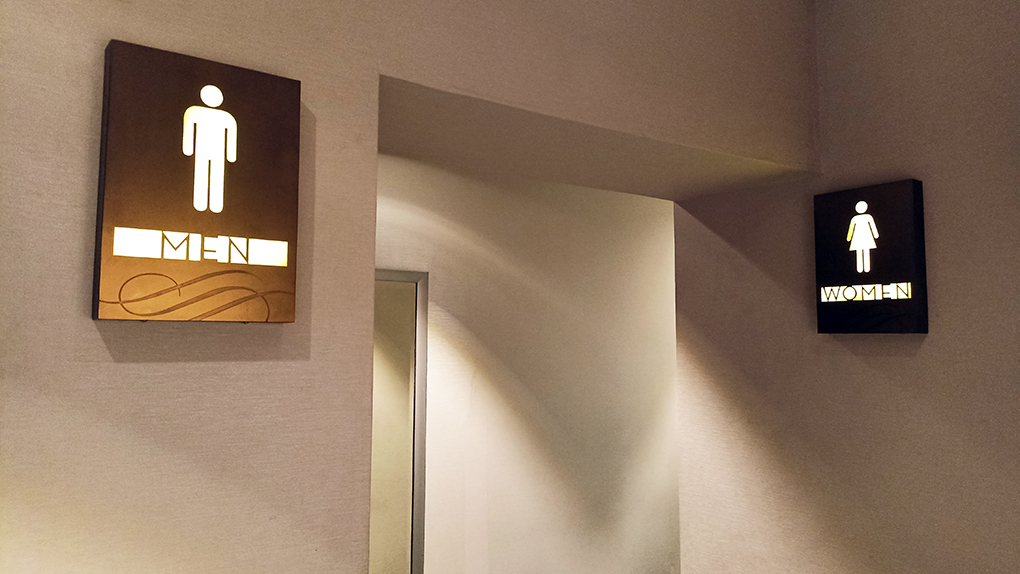Alabama legislature seeks to define men, women
Published 3:58 pm Wednesday, February 12, 2025

- Public restroom. file photo
The Alabama Senate codified definitions for men and women into law on Wednesday, Feb. 6, but opponents to the bill said the law could likely lead to uncomfortable, and even unsafe, situations for women and transgender individuals.
Senate Bill 79 from Sen. April Weaver, R-Shelby County, is a reworking of legislation introduced in 2024 by Rep. Susan DuBose, R-St. Clair County, referred to as the “What is a Woman Bill.”
The “What is a Woman Bill” — named after a documentary by conservative political commentator Matt Walsh — easily passed through the Alabama House in 2023. However, the bill floundered in the Senate during the legislative session’s final days.
Weaver defended the bill during a Senate committee hearing on Tuesday. She described it as setting “simple” and “common sense” definitions for the terms “male,” “female,” “boy,” “girl,” “father,” and “mother.” Weaver, along with representatives from the Alabama Policy Institute and Eagle Forum Alabama speaking in favor of the bill, said these definitions were needed to provide Alabama judges and state agencies more clarity when interpreting the law.
“If we didn’t have such trendy and dangerous social theories, we wouldn’t need these definitions,” Weaver said during a debate on the Senate floor Wednesday afternoon.
The bill defines a male as “an individual who has, had, will have, or would have, but for a developmental anomaly, genetic anomaly, or accident, the reproductive system that at some point produces sperm.
Female is defined as “an individual who has, had, will have, or would have, but for a developmental anomaly, genetic anomaly, or accident, the reproductive system that at some point produces ova.”
Weaver stated her intention with the bill was not to discriminate against any particular demographic or to prevent individuals from identifying with a different sex than they had been assigned at birth. Instead, she said the law needed clearer definitions to provide judges and state agencies more clarity when making determinations.
When reached by phone Thursday, Feb. 6, Cullman County District Judge Rusty Turner was unable to recall an instance in which the current Alabama statute had been insufficient.
“Up to this point, no, I’ve never had that be an issue,” Turner said. “In the 13 years I’ve been doing this, I don’t think this has ever come up.”
The bill was originally designed to be a stand-alone piece of legislation which would require state agencies and institutions to install multi-occupancy, single-sex restrooms, changing rooms and sleeping quarters. However, Weaver submitted a substitute bill more closely resembling one reintroduced by Dubose that codifies the definitions into all applicable statutes in Alabama law.
Several opponents encouraged Senate committee members to consider the full scope of the ramifications such strict definitions could have.
Micah Saunders, a transgender male from Birmingham, Alabama, said that while the majority of the conversation around the transgender bathroom debate has focused on protecting women’s spaces, there has been little consideration given to how these laws would require transgender men to use women’s facilities.
“With my beard and receding hairline, I believe it’s obvious that I’m a man. However, with this bill’s narrow definition, I would be considered a female. Many men like me would be required to use women’s bathrooms, locker rooms and dorms.” Saunders said, “However, this would make it obviously an uncomfortable and confusing environment.”
Rep. DuBose and Cullman County Senator Garlan Gudger, who appears as one of the bill’s co-sponsors, did not reply to a request from The Times to respond to these concerns.
Saunders also said the law, as presented, would incentivize action to be taken against biological females if they have more masculine features.
A similar incident occurred in the U.S. Capitol in January when GOP lawmaker Lauren Boebert, R-Colorado, made claims of a “guy” inside a women’s restroom to security personnel in the presence of Bloomberg Congress reporter Billy House. Boebert later admitted she “made an error regarding a mistaken identity,” in a statement to The Daily Beast.
Other opponents of the bill said they had been previously harassed or threatened with violence for attempting to use the restroom of the gender they were assigned at birth.




